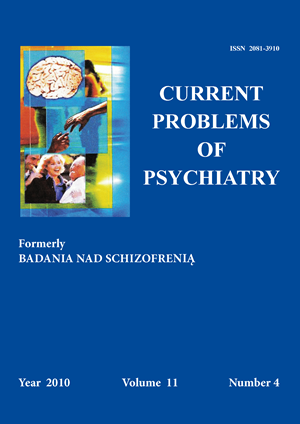Are dual action antidepressants superior than selective antidepressants? Part I
Słowa kluczowe:
antidepressants – SNRIs - SSRIs– treatment guidelinesAbstrakt
Depression is a complex disease with some psychiatric comorbidities, especially anxiety disorders and some comorbid physical symptoms.During the past few years, there has been a strong interest in the development of dual-action antidepressants with a better side effect profile. There are interesting pharmacological reasons why an antidepressant that act on more that one neurotransmitter system might have superior efficacy than antidepressant with single action. There also is an increasing body of evidence for an efficacy advantage in some patients with selective dual-action antidepressants, especially in large group of patients with high manifestation of physical symptoms of depression. Dual-acting antidepressants that inhibit reuptake of both serotonin and norepinephrine (SNRIs) treat a wider array of depressive symptoms (psychological and physical) than antidepressants that target either neurotransmitter alone. SNRIs such as venlafaxine, and duloxetine, may have an earlier onset of action, superior remission abilities, and better efficacy in treating anxiety symptoms of depression than the SSRIs. The remission rates of the patients taking venlafaxine were significantly higher than those of the patients taking SSRIs, regardless of age or gender. Overall, dual-acting agents appear to be more effective than single-acting agents in improving mood, reducing pain, and increasing the chance of remission.
Bibliografia
1. American Psychiatric Association. Diagnostic and statistical manual of mental disorders. APPI; Washington DC: 1994.
2. Kennedy S.H., Lam R.W., Nutt D.J., Thase M.E. Treating depression effectively. Applying clinical guidelines. Martin Dunitz; London-New York: 2007.
3. Delgado P.L., Charney D.S., Price L.H., Aghajanian G.K., Landis H., Heninger G.R. Serotonin function and the mechanism of antidepressant action: reversal of antidepressant-induced remission by rapid depletion of plasma tryptophan. Arch. Gen. Psychiatry, 1990; 47: 411-418.
4. Miller H.L., Delgado P.L., Salomon R.M., Berman R., Krystal J.H., Heninger G.R., Charney D.S. Clinical and biochemical effects of catecholamine depletion on antidepressant-induced remission of depression. Arch. Gen. Psychiatry, 1996; 53: 117-128.
5. Tran P., Bymaster F.P., McNamara R.K., Potter W.Z. Dual monoamine modulation for improved treatment of major depressive disorder. J. Clin. Psychopharmacol., 2003; 23: 78-86.
6. Thase M.E., Entsuah A.R., Rudolph R.L. Remission rates during treatment with venlafaxine or selective serotonin reuptake inhibitors. Br. J. Psychiatry, 2001; 178: 234-241.
7. Sindrup S.H., Jensen T.S. Efficacy of pharmacological treatments of neuropathic pain: an update and effect related to mechanism of drug action. Pain, 1999; 88: 389-400.
8. Barkin R.L., Fawcett J. The management challenges of chronic pain: the role of antidepressants. Am. J. Ther., 2000; 7: 31-47.
9. Kunz N.R., Goli V., Entsuah R., et al. Diabetic neuropathic pain management with venlafaxine extended release. Eur. Neuropsychopharmacol., 2000; 10(suppl 3): S389.
10. Nelson J.C., Mazure C.M., Bowers M.B. Jr, Jatlow P.I. A preliminary, open study of the combination of fluoxetine and desipramine for rapid treatment of major depression. Arch. Gen. Psychiatry, 1991; 48: 303-307.
11. Entsuah A.R., Huang H., Thase M.E. Response and remission rates in different subpopulations with major depressive disorder administered venlafaxine, selective serotonin reuptake inhibitors, or placebo. J. Clin. Psychiatry, 2001; 62: 869-877.
12. Jain R Single-action versus dual-action antidepressants. J Clin Psychiatry, 2004; 6(suppl 1): 7-11.


